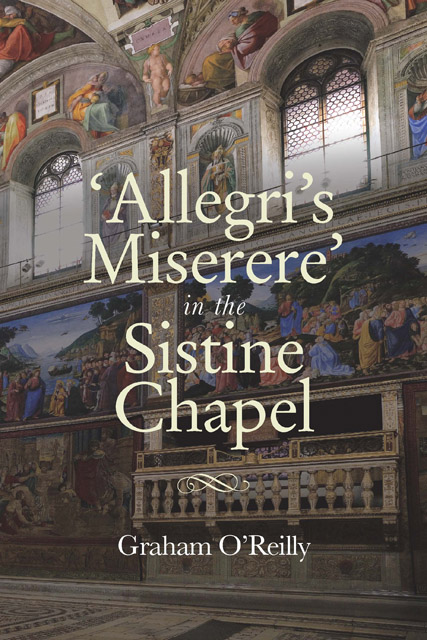Book contents
- Frontmatter
- Contents
- List of illustrations
- List of tables
- List of music examples
- Acknowledgments
- Note on the text
- Introduction: myth and reality
- Part One The Sixteenth and Seventeenth Centuries
- Part Two The Eighteenth Century
- Part Three The Nineteenth Century
- Part Four Performing the Miserere in the Twentieth Century
- Part Five Appendices, Editions and Notes
- List of appendices
- Bibliography
- Index
12 - Nineteenth-century sources 3 – The Vatican manuscript of Domenico Mustafà
Published online by Cambridge University Press: 13 January 2023
- Frontmatter
- Contents
- List of illustrations
- List of tables
- List of music examples
- Acknowledgments
- Note on the text
- Introduction: myth and reality
- Part One The Sixteenth and Seventeenth Centuries
- Part Two The Eighteenth Century
- Part Three The Nineteenth Century
- Part Four Performing the Miserere in the Twentieth Century
- Part Five Appendices, Editions and Notes
- List of appendices
- Bibliography
- Index
Summary
The final source
By 1892, when Mustafà created the final and most important source of knowledge of the ‘Allegri Miserere’ in the nineteenth century, circumstances in the Vatican had changed dramatically. In 1870 the Papal States had been annexed by the new Kingdom of Italy at the climax of the Risorgimento. Over the following decades expensive ceremonial at the Vatican would be greatly reduced, and part of the cost-cutting would eventually include the disbanding of the College of Papal Singers, whose members would be merged with those of the choirs of the Basilica of S. Pietro (the Cappella Giulia) and of the Cathedral of S. Giovanni Laterano (the Cappella Pia). The new choir would eventually be called the Cappella Musicale Pontificia ‘Sistina’ (popularly but mistakenly known in English as the Choir of the Sistine Chapel), which continued (and continues) to perform at important feasts, although hardly ever in the Chapel itself.
The seven years following the Risorgimento, which coincided with the end of the reign of Pius IX, were a disastrous period for the choir. In a fit of what some have described as pique, he declared himself ‘prigioniero in Vaticano’ and closed it entirely to visitors. At the same time he suspended most of the choir’s musical obligations. Holy Week offices remained, but were given in private. What is more, for seven years ‘no disciplinary orders were issued, no voice searches undertaken … a general and clear abrogation of decrees, interest and tradition, accumulated little by little. A real disaster. Seven years were enough to destroy the work of centuries.’
Only the death of Pius IX and the accession of Leo XIII in 1878 gave new hope and direction. The new Pope restored the choir’s duties and re-established discipline. He also had to rapidly resolve Mustafà’s status, whose title of direttore perpetuo dei concertisti was not definitive enough for some of the singers, notably Innocenzo Pasquali. It was only after an attempted coup in 1881, and much argument, that Mustafà was finally given the title of direttore generale perpetuo, the only castrato to be so honoured.
Confronted by the increasingly influential ‘Cecilian’ movement (the Cäcilianismus), whose wish for a return to what they saw as ‘first principles’ in Gregorian plainchant and stile antico polyphony was allied to a desire to replace castrati with boys on the highest parts, Mustafà was not a man to give up lightly.
- Type
- Chapter
- Information
- Allegri's Miserere in the Sistine Chapel , pp. 169 - 182Publisher: Boydell & BrewerPrint publication year: 2020



